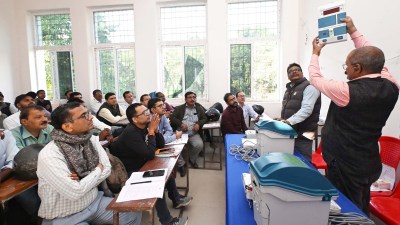📣 For more lifestyle news, click here to join our WhatsApp Channel and also follow us on Instagram
The documentary ‘Are They Better Off’ explores the matrilineal society of Meghalaya
Multiple award winning director Aditya Seth focuses on Meghalayan values of rejoicing the birth of a girl, in his latest documentary 'Are they better off'.
 A still form Aditya Seth’s documentary ‘Are they better off’ showing Meghalayan girls in traditional wear. (Express Photo)
A still form Aditya Seth’s documentary ‘Are they better off’ showing Meghalayan girls in traditional wear. (Express Photo)
“In our society, people don’t look down upon single mothers. Instead of being with men involved in adultery and drunkards, Khasi women prefer staying alone. Children take the mother’s name,” says Hulda Lind Kynta in the documentary Are They Better Off (2015). She is a khatduh, the youngest daughter in the Khasi tribe from Meghalaya. Her lineage is from mother’s clan or kur. Directed by Aditya Seth, the 60-minute documentary focuses on this matrilineal society of Meghalaya, where people rejoice when a girl is born. Are They Better Off will be screened at the National Centre for the Performing Arts, Mumbai, on August 12 at 6.30 pm.
Through the landscapes of Shillong and Cherrapunji, the film showcases the lives of three Khasi women — Hulda Lind Kynta, Selinda Kharbuki and Jubelee Kharmujai. “This is one place where women are actually respected and preferred. The girl child is not discriminated against, or aborted or killed. I thought people should know about such a not-run-of-the-mill society,” says 50-year-old Seth, of the film that took two years to complete.
Mumbai-based Seth began his career in 1987 as an assistant director to Prakash Jha. His last project Bahadur: The Accidental Brave (2011), a documentary on Nepalese labour migration to Mumbai, won the award for the Best Documentary at the 2nd Dada Saheb Phalke Film Festival in 2012 and the Best Feature Film (Non-Fiction) Award at The Indian Independent Film Festival in 2013.
In Are They Better Off , the three protagonists are khatduhs, who according to the Khasi tradition inherit the family wealth and property as they are the part of the family for the longest period. But with economic development fuelling migration, the importance of traditional and cultural values of the society has been slowly diminishing. “The elders prefer that their children remain unmarried rather than marry a non-Khasi, as that often leads to a loss of Khasi tradition and language,” says 52-year-old Kynta, when asked about the challenges that the tribe faces.
“In our society, over the years, women have asserted themselves. Similarly slowly and steadily, the men are also asserting themselves in the matrilineal society of Meghalaya. The dissent is already there,” says Seth. His next documentary will be on women’s movements and feminism
📣 For more lifestyle news, click here to join our WhatsApp Channel and also follow us on Instagram



- 01
- 02
- 03
- 04
- 05
























